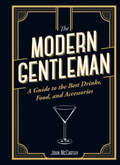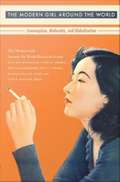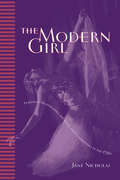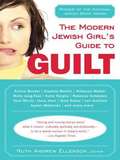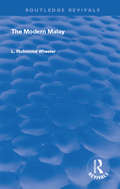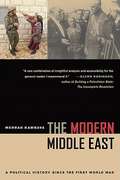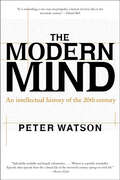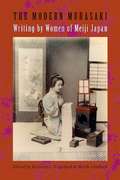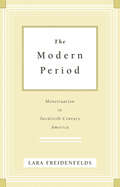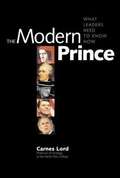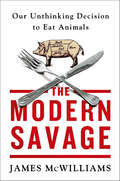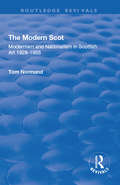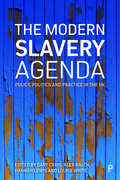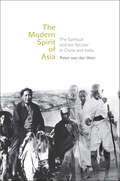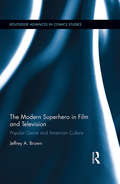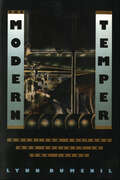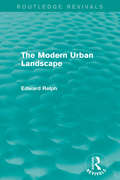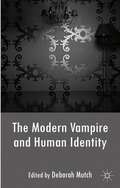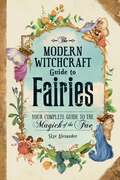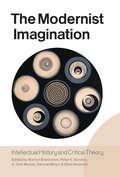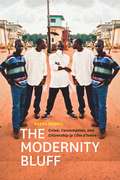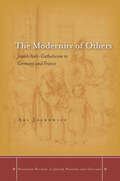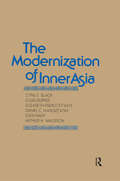- Table View
- List View
The Modern Gentleman: The Guide to the Best Food, Drinks, and Accessories
by John McCarthyThis compact volume introduces modern gentlemen to some of the greatest pleasures in life, from the very best spirits to the most complex hot sauces to the suavest of accessories. The book is targeted to aspiring bon vivants, modern metrosexuals, millennials, and hipsters eager to become the new gentleman. Content not only includes quick guides to great drinks, foods, and cigars, but also makes the case for why every real gentleman needs a great flask, a classic pen, and a watch that may not be &“smart&” but will make you look and feel like 007. Features short essays on each subject, with classic illustrations accompanying each, all in a handsome package that will evoke thoughts of a trusted old leather-bound book.
The Modern Girl Around the World: Consumption, Modernity, and Globalization
by Madeleine Yue Dong Lynn M. Thomas Uta G. Poiger Tani E. Barlow Alys Eve Weinbaum Priti RamamurthyDuring the 1920s and 1930s, in cities from Beijing to Bombay, Tokyo to Berlin, Johannesburg to New York, the Modern Girl made her sometimes flashy, always fashionable appearance in city streets and cafes, in films, advertisements, and illustrated magazines. Modern Girls wore sexy clothes and high heels; they applied lipstick and other cosmetics. Dressed in provocative attire and in hot pursuit of romantic love, Modern Girls appeared on the surface to disregard the prescribed roles of dutiful daughter, wife, and mother. Contemporaries debated whether the Modern Girl was looking for sexual, economic, or political emancipation, or whether she was little more than an image, a hollow product of the emerging global commodity culture. The contributors to this collection track the Modern Girl as she emerged as a global phenomenon in the interwar period. Scholars of history, women's studies, literature, and cultural studies follow the Modern Girl around the world, analyzing her manifestations in Germany, Australia, China, Japan, France, India, the United States, Russia, South Africa, and Zimbabwe. Along the way, they demonstrate how the economic structures and cultural flows that shaped a particular form of modern femininity crossed national and imperial boundaries. In so doing, they highlight the gendered dynamics of interwar processes of racial formation, showing how images and ideas of the Modern Girl were used to shore up or critique nationalist and imperial agendas. A mix of collaborative and individually authored chapters, the volume concludes with commentaries by Kathy Peiss, Miriam Silverberg, and Timothy Burke. Contributors: Davarian L. Baldwin, Tani E. Barlow, Timothy Burke, Liz Conor, Madeleine Yue Dong, Anne E. Gorsuch, Ruri Ito, Kathy Peiss, Uta G. Poiger, Priti Ramamurthy, Mary Louise Roberts, Barbara Sato, Miriam Silverberg, Lynn M. Thomas, Alys Eve Weinbaum
The Modern Girl: Feminine Modernities, the Body, and Commodities in the 1920s
by Jane NicholasWith her short skirt, bobbed hair, and penchant for smoking, drinking, dancing, and jazz, the "Modern Girl" was a fixture of 1920s Canadian consumer culture. She appeared in art, film, fashion, and advertising, as well as on the streets of towns from coast to coast. In The Modern Girl, Jane Nicholas argues that this feminine image was central to the creation of what it meant to be modern and female in Canada. Using a wide range of visual and textual evidence, Nicholas illuminates both the frequent public debates about female appearance and the realities of feminine self-presentation. She argues that women played an active and thoughtful role in their embrace of modern consumer culture, even when it was at the risk of serious social, economic, and cultural penalties. The first book to fully examine the "Modern Girl"'s place in Canadian culture, The Modern Girl will be essential reading for all those interested in the history of gender, sexuality, and the body in the modern world.
The Modern Jewish Girl's Guide to Guilt
by Ruth Andrew EllensonTwenty-eight of today's top Jewish women writers tell the truth about all the things their rabbis warned them never to discuss in public in this hilarious and provocative collection. Includes original essays on: * Finding (and Divorcing) the Perfect Jewish Man * Not Calling Your Mother * Marrying a German * Failing to Supply Enough Grandchildren * Learning to RSVP No * And many other guilty pleasures . . . Includes pieces by: Elisa Albert, Aimee Bender, Jennifer Bleyer, Kera Bolonik, Rabbi Sharon Brous, Baz Dreisinger, Pearl Gluck, Rebecca Goldstein, Lori Gottlieb, Lauren Grodstein, Dara Horn, Molly Jong-Fast, Rachel Kadish, Jenna Kalinsky, Cynthia Kaplan, Binnie Kirshenbaum, Amy Klein, Daphne Merkin, Tova Mirvis, Gina Nahai, Katie Rophie, Francesca Segré, Wendy Shanker, Laurie Gwen Shapiro, Susan Shapiro, Ayelet Waldman, Rebecca Walker, Sheryl Zohn
The Modern Malay (Routledge Revivals)
by L. Richmond WheelerFirst published in 1928, this book us a very complete survey of the Malay Peninsula, its physical aspects, its history, laws government, and present day problems; while a large part of the book is devoted to a study of the Malay himself. Mr. Wheeler, who has travelled far and wide, has spent seven years in Malay, and the thorough research which has gone to the making of the book is backed up with personal experience and observation, with the result that the book is as readable as it sounds.
The Modern Middle East
by Mehran KamravaSince it was first published in 2006, this concise overview of the making of the contemporary Middle East has become essential reading for students and general readers who want to gain a better understanding of this diverse region. Writing for a wide audience, Mehran Kamrava takes us from fall of the Ottoman Empire to today, exploring along the way such central issues as the dynamics of economic development, authoritarian endurance, and the Israel-Palestinian conflict. For this new, thoroughly revised edition, he has brought the book fully up to date by incorporating events and issues of the past few years. The Modern Middle East now includes information about the June 2009 Iranian presidential elections and their aftermath, changes precipitated so far by the Obama administration, Israel's attack on Gaza in 2008, the effects of globalization on economic development, and more.
The Modern Mind: An Intellectual History of the 20th Century
by Peter Watson“Splendidly readable and hugely informative. . . . Episode after episode from the cultural life of the twentieth century springs to vivid life.” —Boston GlobeFrom Freud to Babbitt, from Animal Farm to Sartre to the Great Society, from the Theory of Relativity to counterculture to Kosovo, The Modern Mind is encyclopedic, covering the major writers, artists, scientists, and philosophers who produced the ideas by which we live. Peter Watson has produced a fluent and engaging narrative of the intellectual tradition of the twentieth century, and the men and women who created it.“Watson’s rich narrative covers every corner of intellectual life in the twentieth century.” —Publishers Weekly“Packed with a multitude of events, ideas, and influential people, Watson’s infectious writing carries the reader swiftly along. . . . This book will be read and consulted for many years.” —Library Journal “Enthralling, illuminating, and intellectually titillating.” —Booklist
The Modern Murasaki: Writing by Women of Meiji Japan (Asia Perspectives: History, Society, and Culture)
by Rebecca Copeland Melek OrtabasiThe first anthology of its kind, The Modern Murasaki brings the vibrancy and rich imagination of women's writing from the Meiji period to English-language readers. Along with traditional prose, the editors have chosen and carefully translated short stories, plays, poetry, speeches, essays, and personal journal entries. Selected readings include writings by the public speaker Kishida Toshiko, the dramatist Hasegawa Shigure, the short-fiction writer Shimizu Shikin, the political writer Tamura Toshiko, and the novelists Miyake Kaho, Higuchi Ichiyo, Tazawa Inabune, Kitada Usurai, Nogami Yaeko, and Mizuno Senko. The volume also includes a thorough introduction to each reading, an extensive index listing historical, social, and literary concepts, and a comprehensive guide to further research.The fierce tenor and bold content of these texts refute the popular belief that women of this era were passive and silent. A vital addition to courses in women's studies and Japanese literature and history, The Modern Murasaki is a singular resource for students and scholars.
The Modern Period: Menstruation in Twentieth-Century America
by Lara FreidenfeldsWinner, 2010 Emily Toth Award for Best Book in Women’s Studies, Popular Culture Association/American Culture AssociationThe Modern Period examines how and why Americans adopted radically new methods of managing and thinking about menstruation during the twentieth century. In the early twentieth century women typically used homemade cloth "diapers" to absorb menstrual blood, avoided chills during their periods to protect their health, and counted themselves lucky if they knew something about menstruation before menarche. New expectations at school, at play, and in the workplace, however, made these menstrual traditions problematic, and middle-class women quickly sought new information and products that would make their monthly periods less disruptive to everyday life.Lara Freidenfelds traces this cultural shift, showing how Americans reframed their thinking about menstruation. She explains how women and men collaborated with sex educators, menstrual product manufacturers, advertisers, physical education teachers, and doctors to create a modern understanding of menstruation. Excerpts from seventy-five interviews—accounts by turns funny and moving—help readers to identify with the experiences of the ordinary people who engineered these changes. The Modern Period ties historical changes in menstrual practices to a much broader argument about American popular modernity in the twentieth century. Freidenfelds explores what it meant to be modern and middle class and how those ideals were reflected in the menstrual practices and beliefs of the time. This accessible study sheds new light on the history of popular modernity, the rise of the middle class, and the relationship of these phenomena to how Americans have cared for and managed their bodies.
The Modern Prince: What Leaders Need to Know Now
by Carnes LordIn this penetrating work, an eminent political scientist offers a provocative treatise on the requirements of leadership in the modern world.
The Modern Prison Paradox
by Amy E. LermanIn The Modern Prison Paradox, Amy E. Lerman examines the shift from rehabilitation to punitivism that has taken place in the politics and practice of American corrections. She argues that this punitive turn has had profoundly negative consequences for both crime control and American community life. Professor Lerman's research shows that spending time in America's increasingly violent and castigatory prisons strengthens inmates' criminal networks and fosters attitudes that increase the likelihood of criminal activity following parole. Additionally, Professor Lerman assesses whether America's more punitive prisons similarly shape the social attitudes and behaviors of correctional staff. Her analysis reveals that working in more punitive prisons causes correctional officers to develop an "us against them" mentality while on the job, and that the stress and wariness officers acquire at work carries over into their personal lives, straining relationships with partners, children, and friends.
The Modern Savage: Our Unthinking Decision to Eat Animals
by James McWilliamsJust Food author James McWilliams's exploration of the "compassionate carnivore" movement and the paradox of humanity's relationship with animals.In the last four decades, food reformers have revealed the ecological and ethical problems of eating animals raised in industrial settings, turning what was once the boutique concern of radical eco-freaks into a mainstream movement. Although animal products are often labeled "cage free," "free range," and "humanely raised," can we trust these goods to be safe, sound, or ethical?In The Modern Savage, renowned writer, historian, and animal advocate James McWilliams pushes back against the questionable moral standards of a largely omnivorous world and explores the "alternative to the alternative"-not eating domesticated animals at all. In poignant, powerful, and persuasive prose, McWilliams reveals the scope of the cruelty that takes place even on the smallest and-supposedly-most humane animal farms. In a world increasingly aware of animals' intelligence and the range of their emotions, McWilliams advocates for the only truly moral, sustainable choice-a diet without meat, dairy, or other animal products.The Modern Savage is a riveting expose of an industry that has typically hidden behind a veil of morality, and a compelling account of how to live a more economical, environmental, and ethical life.
The Modern Scot: Modernism and Nationalism in Scottish Art, 1928-1955 (Routledge Revivals Ser.)
by Tom NormandThis title was first published in 2000: An investigation of Scottish art between 1928 and 1955 to bring into focus the multifaceted project that was Scottish modernism. At the core of this work lies the contention that Scottish modernism was underpinned by a desire to express a national consciousness. It was this ambition which became the defining feature of radical Scottish art, setting the parameters of its relationship with the idea of a coherent and international modern movement. With the foundation of the National Party of Scotland in 1928, Scottish intellectuals began to consider the nature of national identity and the characteristics of a national art. The "Scottish Renaissance Movement", under the voluble leadership of Hugh MacDiarmid, set out to articulate these interests, developing a vernacular poetry and literature. For Scottish artists, the way forward was harder to identify, as they fought to reconcile the demands for a Scottish national art with the stylistic revolution of international modernism. Tom Normand examines the competing claims of nationalism and modernism as they affected Scottish art. This in-depth analysis of a dynamic episode in Scottish visual culture looks at the work of, among others, William Johnstone, William McCance and John Duncan Fergusson.
The Modern Slavery Agenda: Policy, Politics and Practice
by Gary Craig, Alex Balch, Hannah Lewis and Louise WaiteModern slavery, in the form of labour exploitation, domestic servitude, sexual trafficking, child labour and cannabis farming, is still growing in the UK and industrialised countries, despite the introduction of laws to try to stem it. This hugely topical book, by a team of high-profile activists and expert writers, is the first critically to assess the legislation, using evidence from across the field, and to offer strategies for improvement in policy and practice. It argues that, contrary to its claims to be ‘world-leading’, the Modern Slavery Act is inconsistent, inadequate and punitive; and that the UK government, through its labour market and immigration policies, is actually creating the conditions for slavery to be promoted.
The Modern Spirit of Asia: The Spiritual and the Secular in China and India
by Peter van der VeerA comparative look at religion and spirituality in postcolonial China and IndiaThe Modern Spirit of Asia challenges the notion that modernity in China and India are derivative imitations of the West, arguing that these societies have transformed their ancient traditions in unique and distinctive ways. Peter van der Veer begins with nineteenth-century imperial history, exploring how Western concepts of spirituality, secularity, religion, and magic were used to translate the traditions of India and China. He traces how modern Western notions of religion and magic were incorporated into the respective nation-building projects of Chinese and Indian nationalist intellectuals, yet how modernity in China and India is by no means uniform. While religion is a centerpiece of Indian nationalism, it is viewed in China as an obstacle to progress that must be marginalized and controlled.The Modern Spirit of Asia moves deftly from Kandinsky's understanding of spirituality in art to Indian yoga and Chinese qi gong, from modern theories of secularism to histories of Christian conversion, from Orientalist constructions of religion to Chinese campaigns against magic and superstition, and from Muslim Kashmir to Muslim Xinjiang. Van der Veer, an outspoken proponent of the importance of comparative studies of religion and society, eloquently makes his case in this groundbreaking examination of the spiritual and the secular in China and India.
The Modern Superhero in Film and Television: Popular Genre and American Culture (Routledge Advances in Comics Studies)
by Jeffrey A. BrownHollywood’s live-action superhero films currently dominate the worldwide box-office, with the characters enjoying more notoriety through their feature film and television depictions than they have ever before. This book argues that this immense popularity reveals deep cultural concerns about politics, gender, ethnicity, patriotism and consumerism after the events of 9/11. Superheroes have long been agents of hegemony, fighting for abstract ideals of justice while overall perpetuating the American status quo. Yet at the same time, the book explores how the genre has also been utilized to question and critique these dominant cultural assumptions.
The Modern Temper: American Culture and Society in the 1920s
by Lynn DumenilLynn Dumenil's The Modern Temper provides a unique perspective into the American Jazz Age.When most of us take a backward glance at the 1920s, we may think of prohibition and the jazz age, of movies stars and flappers, of Harold Lloyd and Mary Pickford, of Lindbergh and Hoover--and of Black Friday, October 29, 1929, when the plunging stock market ushered in the great depression. But the 1920s were much more. Lynn Dumenil brings a fresh interpretation to a dramatic, important, and misunderstood decade. As her lively work makes clear, changing values brought an end to the repressive Victorian era; urban liberalism emerged; the federal bureaucracy was expanded; pluralism became increasingly important to America's heterogeneous society; and different religious, ethnic, and cultural groups encountered the homogenizing force of a powerful mass-consumer culture. The Modern Temper brings these many developments into sharp focus.
The Modern Urban Landscape (Routledge Revivals)
by Edward RelphFirst published in 1987, this book provides a wide-ranging account of how modern cities have come to look as they do — differing radically from their predecessors in their scale, style, details and meanings. It uses many illustrations and examples to explore the origins and development of specific landscape features. More generally it traces the interconnected changes which have occurred in architecture and aesthetic fashions, in planning, in economic and social conditions, and which together have created the landscape that now prevails in most of the cities of the world. This book will be of interest to students of architecture, urban studies and geography.
The Modern Vampire and Human Identity
by Deborah MutchVampires are back - and this time they want to be us, not drain us. This collection considers the recent phenomena of Twilight and True Blood, as well as authors such as Kim Newman and Matt Haig, films such as The Breed and Interview with the Vampire, and television programmes such as Being Human and Buffy the Vampire Slayer.
The Modern Witchcraft Guide to Fairies: Your Complete Guide to the Magick of the Fae (Modern Witchcraft Magic, Spells, Rituals)
by Skye AlexanderInteract with magical fairy folk and incorporate them into your own witchcraft practice with this detailed account of the ancient wisdom and traditions of fairies and witchcraft.Fairies have long been a part of witchcraft traditions, especially Celtic and Norse witchcraft, paganism, and other traditions deeply tied to the earth. But these fairies aren&’t the harmless creatures you&’ve read about in children&’s tales: they are magical creatures with their own culture and rules that you need to know before venturing into their territory. Now you can explore the world of the fairies and how their magic relates to your own witchcraft practice with The Modern Witchcraft Book of Fairies. This book provides you with all the information you need to know about the different types of fae folk and how you can safely interact with them to make the most of your witchcraft practice.
The Modernist Imagination
by Peter E. Gordon Samuel Moyn A. Dirk Moses Warren BreckmanSome of the most exciting and innovative work in the humanities currently takes place at the intersection of intellectual history and critical theory. Just as critical theorists are becoming more aware of the historicity of theory, contemporary practitioners of modern intellectual history are recognizing their potential contributions to theoretical discourse. No one has done more than Martin Jay to realize the possibilities for mutual enrichment between intellectual history and critical theory. This carefully selected collection of essays addresses central questions and current practices of intellectual history and asks how the legacy of critical theory has influenced scholarship across a wide range of scholarly disciplines. In honor of Martin Jay's unparalleled achievements, this volume includes work from some of the most prominent contemporary scholars in the humanities and social sciences.
The Modernity Bluff: Crime, Consumption, and Citizenship in Côte D'Ivoire
by Sasha NewellIn Côte d’Ivoire, appearing modern is so important for success that many young men deplete their already meager resources to project an illusion of wealth in a fantastic display of Western imitation, spending far more than they can afford on brand name clothing, accessories, technology, and a robust nightlife. Such imitation, however, is not primarily meant to deceive—rather, as Sasha Newell argues in The Modernity Bluff, it is an explicit performance so valued in Côte d’Ivoire it has become a matter of national pride. Called bluffeurs, these young urban men operate in a system of cultural economy where reputation is essential for financial success. That reputation is measured by familiarity with and access to the fashionable and expensive, which leads to a paradoxical state of affairs in which the wasting of wealth is essential to its accumulation. Using the consumption of Western goods to express their cultural mastery over Western taste, Newell argues, bluffeurs engage a global hierarchy that is profoundly modern, one that values performance over authenticity—highlighting the counterfeit nature of modernity itself.
The Modernity Bluff: Crime, Consumption, and Citizenship in Côte d’Ivoire
by Sasha NewellIn Côte d’Ivoire, appearing modern is so important for success that many young men deplete their already meager resources to project an illusion of wealth in a fantastic display of Western imitation, spending far more than they can afford on brand name clothing, accessories, technology, and a robust nightlife. Such imitation, however, is not primarily meant to deceive—rather, as Sasha Newell argues in The Modernity Bluff, it is an explicit performance so valued in Côte d’Ivoire it has become a matter of national pride. Called bluffeurs, these young urban men operate in a system of cultural economy where reputation is essential for financial success. That reputation is measured by familiarity with and access to the fashionable and expensive, which leads to a paradoxical state of affairs in which the wasting of wealth is essential to its accumulation. Using the consumption of Western goods to express their cultural mastery over Western taste, Newell argues, bluffeurs engage a global hierarchy that is profoundly modern, one that values performance over authenticity—highlighting the counterfeit nature of modernity itself.
The Modernity of Others: Jewish Anti-Catholicism in Germany and France
by Ari JoskowiczThe most prominent story of nineteenth-century German and French Jewry has focused on Jewish adoption of liberal middle-class values. "The Modernity of Others" points to an equally powerful but largely unexplored aspect of modern Jewish history: the extent to which German and French Jews sought to become modern by criticizing the anti-modern positions of the Catholic Church. Drawing attention to the pervasiveness of anti-Catholic anticlericalism among Jewish thinkers and activists from the late eighteenth to the early twentieth century, the book turns the master narrative of Western and Central European Jewish history on its head. From the moment in which Jews began to enter the fray of modern European politics, they found that Catholicism served as a convenient foil that helped them define what it meant to be a good citizen, to practice a respectable religion, and to have a healthy family life. Throughout the long nineteenth century, myriad Jewish intellectuals, politicians, and activists employed anti-Catholic tropes wherever questions of political and national belonging were at stake: in theoretical treatises, parliamentary speeches, newspaper debates, the founding moments of the Reform movement, and campaigns against antisemitism.
The Modernization of Inner Asia
by Cyril E. Black Louis Dupree Elizabeth Endicott-West Daniel C. Matuszewski Eden Naby Arthur N. WaldronInner Asia - in premodern times the little-known land of nomads and semi-nomads - has moved to the world's front page in the 20th century as the complex struggles for the future of Afghanistan, Soviet Central Asia, Tibet and other territories make clear. But because Inner Asia as a whole is divided among several states politically and among area specialists academically, broad perspectives on recent events are difficult to find. This work treats the region as a single unit, providing both an account of the region's past and an analysis of its present and its prospects in a thematic, rather than a strictly country-by-country manner.
